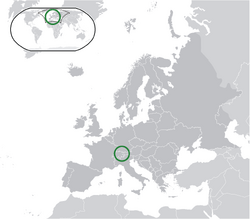|
Fürstentum Liechtenstein | |

|

|
| Motto Für Gott, Fürst und Vaterland | |
| Anthem Oben am jungen Rhein | |
| Capital | Vaduz |
| Government | Constitutional monarchy and parliamentary democracy |
| Prince | |
| - From 1989 | Hans-Adam II |
| Regent | |
| - From 2004 | Alois |
| Prime minister | |
| - From 2009 | Klaus Tschütscher |
| Legislature | Landtag |
| History | |
| - 1806 | Treaty of Pressburg |
| - 1866 | Independence from the German Confederation |
| Area | 160.475 km² |
| Population | |
| - 2009 | 35,789 |
| Density | 223/km² |
| GDP | 2009 (PPP) |
| - Total | US$ 3.2 billion |
| - Per capita | US$ 91,697 |
| Currency | Swiss franc |
| v | |
The Principality of Liechtenstein is a constitutional monarchy in Europe.
Background
The Principality of Liechtenstein was established within the Holy Roman Empire in 1719. Occupied by both French and Russian troops during the Napoleonic wars, it became a sovereign state in 1806 and joined the Germanic Confederation in 1815. Liechtenstein became fully independent in 1866 when the Confederation dissolved. Until the end of World War I, it was closely tied to Austria, but the economic devastation caused by that conflict forced Liechtenstein to enter into a customs and monetary union with Switzerland. Since World War II (in which Liechtenstein remained neutral), the country's low taxes have spurred outstanding economic growth. In 2000, shortcomings in banking regulatory oversight resulted in concerns about the use of financial institutions for money laundering. However, Liechtenstein implemented anti-money-laundering legislation and a Mutual Legal Assistance Treaty with the US that went into effect in 2003.[1]
Economy
Despite its small size and limited natural resources, Liechtenstein has developed into a prosperous, highly industrialized, free-enterprise economy with a vital financial service sector and the highest per capita income in the world. The Liechtenstein economy is widely diversified with a large number of small businesses. Low business taxes - the maximum tax rate is 20% - and easy incorporation rules have induced many holding companies to establish nominal offices in Liechtenstein providing 30% of state revenues. The country participates in a customs union with Switzerland and uses the Swiss franc as its national currency. It imports more than 90% of its energy requirements. Liechtenstein has been a member of the European Economic Area (an organization serving as a bridge between the European Free Trade Association (EFTA) and the EU) since May 1995. The government is working to harmonize its economic policies with those of an integrated Europe. In 2008, Liechtenstein came under renewed international pressure - particularly from Germany - to improve transparency in its banking and tax systems. In December 2008, Liechtenstein signed a Tax Information Exchange Agreement with the US. Upon Liechtenstein's conclusion of 12 bilateral information-sharing agreements, the OECD in October 2009 removed the principality from its "grey list" of countries that had yet to implement the organization's Model Tax Convention.[2]
Prince
- Hans-Adam II (₩) (November 13, 1989 - )
Regent
- Alois (₩) (August 15, 2004 - )
Prime minister
- Klaus Tschütscher (₩) (March 25, 2009 - )
Nation
Neighbouring Nations
References
- Liechtenstein: Guide to Law Online (Library of Congress)
- The World Factbook (CIA)
- Chiefs of State and Cabinet Members of Foreign Governments (CIA)
- U.S. Department of State
- Australian Government
- Inter-Parliamentary Union - Landtag
- BBC News Country Profile
- BBC News Time Line
- World Statesmen.org
- International Constitutional Law Project
- Psephos Election Archive
- Wikisource 1911 encyclopedia project
- Wikipedia
